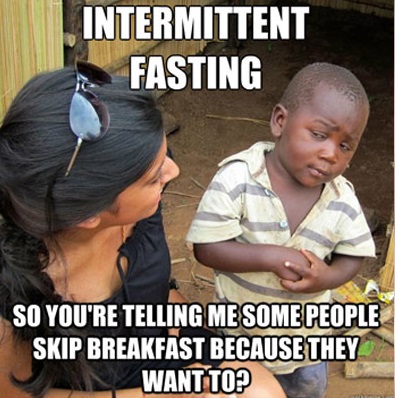You know that you need to eat less calories to lose fat. You want to.
But you somehow ... just can't.
If this sounds like you, you've found the right article.
Enter a game-changing diet method: Intermittent Fasting (IF).

What is IF? To put it quite simply, IF is having a prolonged period in between meals where you don't consume any food or drink that contains calorie. We call this the fasting period. Outside the fasting period is the feasting period, in which a few large meals are consumed.
Everyone actually kind of does IF already - when we are sleeping. How so? We typically have dinner or supper as our last meal of the day before sleeping (and thus fasting) for average of 6-10 hours (some people sleep less than this range, some more). Then we wake up and have breakfast. However, in the case of IF, the time between the last meal and first is longer - many people swear by 16 hours of fasting and an 8 hour period of eating.
An quick example of IF is as follows:
7pm: dinner
11pm: sleep
730am: wake up
11am: first meal of day (usually the largest)
3pm: second meal of day
7pm: third and final meal of day
rinse and repeat
Some possible health benefits of IF:
1) Increase in longevity
2) Improvement in cardiovascular function by offering protection against ischemic injury to the heart
3) Improvement in health-associated markers such as insulin sensitivity
4) Increase in leptin sensitivity. This enables one to be more in-tuned with a leaner body
Some of the above-mentioned benefits happen only after longer periods of fasting - around 20-24 hours of fasting. This is dependent on the individual's activity level. For a less active person, it could take 20-24 hours of fasting. For a relatively active person, 16-20 hours of fasting would do the trick.
Anecdotally, some individuals who have been practicing IF for months claim that their day gets more productive. An explanation could be that the body secrets catecholamines during the fast, which increases energy and suppresses hunger.
So how does IF work? IF works by limiting the duration of the day when you eat. This helps you train your desire to eat, which in turns helps curb hunger and control food intake. Decreased hunger is the number one predictor of weight loss, as shown by research.
How does IF not work? At this point, IF sounds pretty good, doesn't it? Don't get too excited - I have to be upfront with you that IF works only if you are still eating yourself to a long-term state of calorie deficit. This means calories input (through food and drinks) is less than calories output (through bodily functions to help you stay alive and functioning, daily activities and physical activities). So what this means is that you can't expect to fast for 16 hours, then go on a few huge buffets within the 8 hours that cause you to be in calorie surplus, and still expect to lose fat. At least this isn't what research has shown at this point of time.
Who is IF for? IF is for any healthy individual wanting to learn how to better manage food intake and hunger. It can be useful for individuals wanting to diet to pretty extreme levels.
Who is IF not for? Unfortunately, IF is not for everyone. Pregnant women, people who are having or had eating disorders, people who have difficulties gaining weight, certain professional athletes and some people undergoing medical treatment are key types of people not suitable for IF. Do check with a certified nutritionist and medical doctor to be sure if you are suitable for IF.
I hope this article has been informative so far. Stay tuned for part 2, where it will cover a few approaches to IF, and more useful tips!


